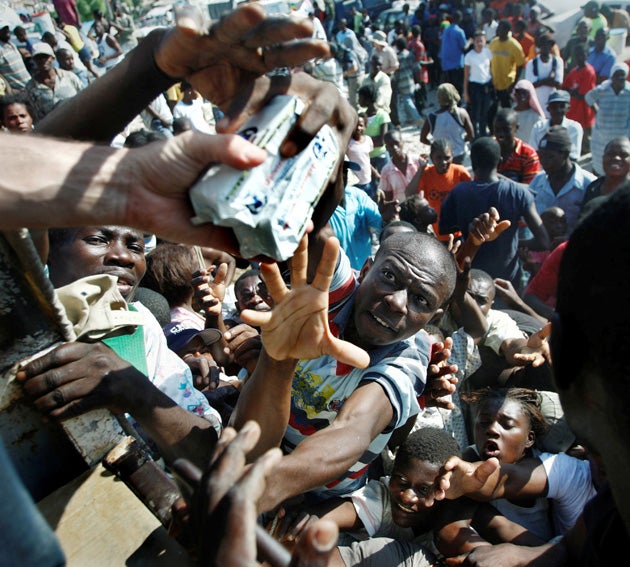Your support helps us to tell the story
From reproductive rights to climate change to Big Tech, The Independent is on the ground when the story is developing. Whether it's investigating the financials of Elon Musk's pro-Trump PAC or producing our latest documentary, 'The A Word', which shines a light on the American women fighting for reproductive rights, we know how important it is to parse out the facts from the messaging.
At such a critical moment in US history, we need reporters on the ground. Your donation allows us to keep sending journalists to speak to both sides of the story.
The Independent is trusted by Americans across the entire political spectrum. And unlike many other quality news outlets, we choose not to lock Americans out of our reporting and analysis with paywalls. We believe quality journalism should be available to everyone, paid for by those who can afford it.
Your support makes all the difference.They come to help, not to invade. That is the mantra being repeated by US soldiers who have finally started being seen in the centre of Port-au-Prince, distributing food, medicine and water in the country that was shaken to its foundations by an earthquake a week ago.
Troops unloading cargo at the airport yesterday knew their presence carries a mixed message to Haitians, who were occupied by the American Marines from 1915 to 1934, and have suffered under a string of dubious US-backed governments during the modern era. Hugo Chavez has already attempted to stoke public hostility to them, accusing Washington of "invading Haiti in the name of aid".
So members of the 82nd Airborne Division, who are among the 1,700 US soldiers now on the ground in Haiti, revealed their new rules of engagement. They hope to win the hearts and minds of the shattered people they have travelled here to help. Gone are angry scowls and wrap-around sunglasses; instead, they are all smiles. And rather than waving machine guns at people, they have been ordered to discreetly carry their weapons on their backs. A total of 10,000 soldiers will be here by tomorrow, and if Uncle Sam is not handing out the Hershey bars quite yet, they're certainly in the post.
"We are very aware of how important the way we present ourselves is, and putting guns behind us is an important step we can take without compromising security," said Sgt Ryan McGee, who had rushed from his base at Fort Bragg, North Carolina. "People are doing very well in tough circumstances. They're showing us a lot of support. There's been cheering, with people shouting 'USA number one!' so we feel welcomed."
In central Port-au-Prince, aid is finally starting to arrive. Water trucks are an increasingly common sight, though they still attract large crowds when they stop on street corners. Former president Bill Clinton toted crates of bottled water at the airport and shook hands. He pledged to provide medicine and a generator so that doctors can work through the night.
Incoming food and medicine is passing through four major UN distribution centres, and about 20 smaller sites run by a selection of aid agencies. Food is readily available on the open market, and a vast influx of fresh fruit and vegetables arrived from the countryside yesterday morning to be sold in the capital's open-air markets. Also reopening were the city's bakeries, selling baguettes.
The death toll is estimated to be anywhere between 100,000 and 200,000, but the dead bodies are starting to be cleared up (I counted just three lying on pavements yesterday). And in places, rebuilding has even started: a team of workmen were reconstructing a shattered wall using breeze blocks and cement at the Bakara Rum Factory.
Normality is still months away, however. To buy produce, you need money. Since most victims were on the breadline even before their homes came crashing down, hundreds of thousands of people remain hungry. Vast crowds are at the gates of government offices, foreign embassies and all surviving businesses in a desperate search for employment.
The most serious shortage, in the long term, may be fuel. Only a handful of petrol stations are still open, and overnight queues are standard at all of them. Prices have increased to $14 for a gallon of diesel, and most major charities say that the critical shortage of fuel is hindering their relief efforts.
Meanwhile search-and-rescue efforts continue, but after almost a week under rubble the chances of people still being alive drop with every hour. On the site of the Caribe Supermarket, once Haiti's biggest, 60 people are thought to be stuck beneath the debris, surviving on bottled water from the store's shelves. Sixteen bodies and four survivors have so far been hauled out. A team of US rescue workers was attempting to retrieve the others yesterday, but by lunchtime had found nothing but corpses.
US coastguards say a hospital ship, the USNS Comfort, will arrive at Port-au-Prince harbour tomorrow, and a sonar team went into the city's port last night to clear a safe passage through the fallen cranes and debris that have until now prevented larger vessels arriving. "The port is critical because that's the pipeline into the city, and once you open a pipeline, things can really start flowing," said Captain Jim McPherson, of the US coastguard.
There are signs that Haiti's airport is also starting to clear. Pallets of rice, dried milk, bottled water, tinned food, medicine, and even Kellogg's Frosties were arriving to be transported.
Stung by criticism of the way they have run the air-traffic-control operation, Captain John Kirby, the Joint Taskforce spokesman, stressed the charitable tone of their mission. "Our focus on the ground is to deliver humanitarian relief," he said. "President Obama couldn't have made our mission more clear: do all we can to relieve the suffering of the Haitian people."

Join our commenting forum
Join thought-provoking conversations, follow other Independent readers and see their replies
Comments